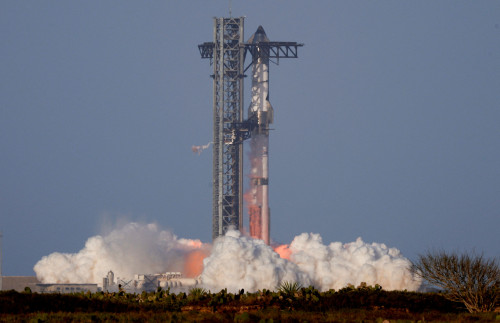By Joey Roulette
WASHINGTON (Reuters) -SpaceX received key U.S. regulatory approval on Tuesday to increase the annual rate of Starship rocket launches from Texas and booster landings in various bodies of water, allowing Elon Musk’s space company to significantly expand development of its giant Mars rocket.
The Federal Aviation Administration, capping a years-long review, said SpaceX’s proposal to increase the number of Texas Starship launches from five to 25 would not have a major impact on the surrounding environment, nor would associated booster landings or potential rocket explosions over the Gulf of Mexico and some international waters.
The agency said it determined that changing SpaceX’s Starship license to support the increased rocket activity “would not significantly impact the quality of the human environment” under the National Environmental Policy Act, a bedrock environmental protection law that required the FAA’s review.
The regulatory green light is a boon for a massive rocket poised to play a key role in the U.S. space program, especially under President Donald Trump.
Musk, who spent a quarter of a billion dollars backing Trump’s election campaign, has influenced the administration’s space agenda to align with his vision of sending humans to Mars, a destination for which Starship is designed.
SpaceX since 2017 has rapidly expanded its Boca Chica, Texas, campus to develop prototypes of Starship, a 40-story-tall rocket whose thundering launches, testing explosions and novel landings have wooed supporters. But they have roiled environmental advocates and some nearby residents concerned about harm to migratory animals and damage to nature reserves.
With the 171 foot (52m) tall Starship sitting atop a 232 foot (71m) tall Super Heavy booster that launches off Earth, the rocket system has had eight integrated test flights since 2023. Each launch has demonstrated an array of milestone achievements or explosive mishaps that embody SpaceX’s risky test-to-failure development playbook.
(Reporting by Joey Roulette; Editing by Chris Reese and Mark Porter)


